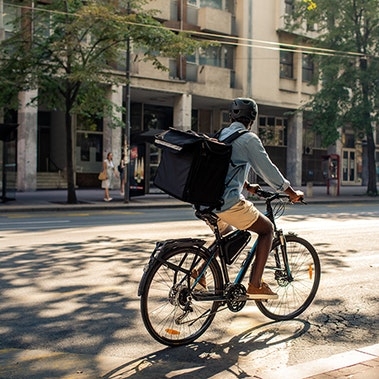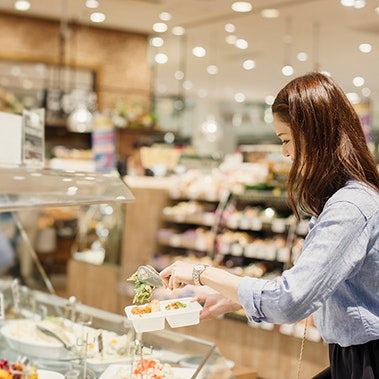The grocery industry looks back with pride at what it achieved during the first months of the pandemic, but the next challenges are around the corner: how to live up to the consumer’s expectations for more sustainability and better value, a combination which is notably difficult to deliver.
For more than 15 years, you’ve been advising grocers and their suppliers. What’s different about this crisis?
In my view the difference is that it’s not one crisis, it’s multiple crises. With the lockdown we experienced a unique situation. It was a crisis that demanded answers to questions we weren’t familiar with, had not experienced before, and had nothing to compare to. The biggest factor was unpredictable demand volatility across channels, formats and product groups. The best comparison here perhaps an impending tornado. When a tornado warning goes out, people stock up on products they will need to survive in case they are stuck in a cellar for a few days. Retailers know through experience that they will need to stock up on batteries, generators, water and non-perishable foods. But in this case, no one knew what would come next or what would be needed, nor for how long. That was the first crisis – but over time, grocers and their suppliers learned and were able to provide an increasingly effective response.
Now, however, most countries are sliding into the next crisis, a recession. We already know this means consumers will become much more price-sensitive, and think twice about whether they really need to spend on this or that item. Value for money in the eyes of the consumer will become critical going forward. For companies, that means they will have to pay more attention to costs and the efficiency improvements necessary to still meet these recessionary market needs with acceptable economics.
Now, however, most countries are sliding into the next crisis, a recession
You focus much of your work on the German-speaking markets – what is happening there now?
Here, companies have traditionally been very focused on pricing, which has been driven by the importance of discounters in the market. At the same time, we see considerable focus on sustainability and other environmental concerns. This mixture of value and sustainability is interesting, but difficult to achieve.
Consumers want to buy with a good conscience, they want sustainable products, and also want to ensure they get maximum value for the money they are spending. Reconciling these two consumer trends is not easy. Many players will find it very difficult to absorb the costs of sustainability on behalf of consumers. For those who do find a way to “square the circle”, increased consumer satisfaction, market share and profitability await.
You recently did a consumer survey in Germany, Austria and Switzerland that indicated consumers’ trust in food retail has risen only slightly during the Corona pandemic, despite high satisfaction ratings. Why?
First, I would emphasize that the market research shows that consumers were and are very satisfied with what retailers have accomplished in these last few months. Consumers recognize that retailers and suppliers by and large were able to avoid shortages, and provide reliably for the necessities of life, even if the shopping experience was very different.
It is also true that most consumers said that their trust in retailers has not risen. Most say that their trust has not changed from before. So you can say that the crisis confirmed the trust that consumers already had for their retailers. True, some gained more trust, but not to a degree strong enough that we can talk of a shift.
What other results from the survey would you like to highlight?
I think it is interesting that consumers signaled a certain willingness to pay more for food if the employment conditions in the industry are improved. I would take this with a grain of salt, but perhaps it shows that sustainability and social responsibility has appeal, or can have appeal to consumers. That remains to be seen.
Consumers signaled a certain willingness to pay more for food if the employment conditions in the industry are improved
What do you see as the next challenge for retailers in the coming months and years?
We are headed for a recession, and it will be a global one. For the industry, that means that discounters will play an increasing role in the coming years, and supermarkets will have to find a way to respond. But it also means that certain habits will be turned on their head for good. The rise in E-commerce is probably here to stay and will not fall back to previous levels. Thus, companies will be forced to focus on lower prices, while at the same time addressing additional channels which are likely to have a higher cost to serve. These realities are likely to benefit discounters the most, as well as those supermarkets who find a way to increase that increase E-commerce volumes most. With volume comes economic efficiency.
I also think that the “working from home” phenomenon is here to stay – less than during the lockdowns, but much more than pre-COVID. If a person spends just one day at their home office per week, that means they are spending 20 percent less time outside of their home. This time is now no longer spent at retail locations that were previously accustomed to that spending. Instead, purchasing will tend to become concentrated into one big weekend shopping trip, while during the week people might order from home using E-commerce options instead. That has a massive influence on brick and mortar.
Linked to that, the trend toward greater convenience and longer opening hours, which had recently been the preferred approach, is now looking less of a sure thing. This means that retailers will be forced to adapt if they had been using convenience formats as a way of strengthening their position.

Dr. Nordal Cavadini Partner, Retail & Consumer Products
Dr. Nordal Cavadini is a partner at Oliver Wyman based in Zurich. He has more than fifteen years of consulting experience in the trading industry from continental Europe and the UK. The focus of his work is on category management, sales, logistics and IT both for retailers (food retailers, specialist shops, DIY) and for manufacturers.



